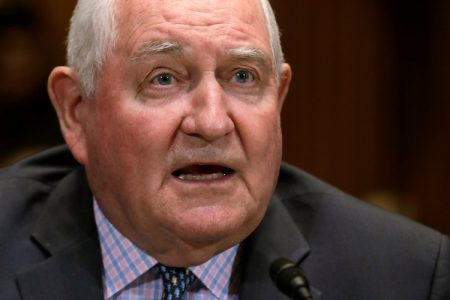 The Trump administration announced on Tuesday that it would provide up to $12 billion in emergency relief for farmers hurt by the president’s trade war, moving to blunt the financial damage to American agriculture and the political fallout for Republicans as the consequences of President Trump’s protectionist policies roll through the economy.
The Trump administration announced on Tuesday that it would provide up to $12 billion in emergency relief for farmers hurt by the president’s trade war, moving to blunt the financial damage to American agriculture and the political fallout for Republicans as the consequences of President Trump’s protectionist policies roll through the economy.
“Today were formally announcing that the Trump administration will be taking several actions to assist farmers in response to the trade damage caused by the illegal retaliatory tariffs that have been imposed on the United States in the past few months,” Agriculture Secretary Sonny Perdue said in a press conference on Tuesday. “The programs we’re announcing today are a firm statement that other nations cannot bully our agriculture producers to force the United States to cave in.”
“This administration will not stand by while our hard-working agriculture producers bear the brunt of unfriendly and illegal tariffs enacted by other nations,” Perdue said. The $12 billion program is “directly in line” with estimated $11 billion impact illegal tariffs are having on farmers, according to Perdue.
The programs include a market facilitation program which would result in farmer payments, a food purchase and distribution program which would purchase a surplus of goods going to nutrition programs, and a trade promotion program to provide private sector assistance to new markets.
“The actions today are a firm statement that other nations cannot bully our agricultural producers to force the United States to cave in,” Sonny Perdue, the secretary of agriculture, said during a call with reporters to unveil the program.
Specific details for how the program will work, how the program will be implemented and how farmers can sign up for payments have not been announced. According to USDA undersecretary, Greg Ibach, the details will be released closer to Labor Day when USDA plans to fully implement the program. “The Trump Tariff Aid plan draws on the financial resources of a program known as the Commodity Credit Corporation (CCC) and Section 32 funding,” said Jim Wiesemeyer Pro Farmer’s Washington policy analyst. “The initiative does not authorize any new money and thus not need approval from Congress. But U.S. taxpayers will see deficits go still higher.”
According to Wiesemeyer, the announcement of this program ups the odds that Trump and his aggressive trade policy officials will continue their escalation of tariff tit-for-tat around the world.
“The approach now shows it will cost American producers (and now taxpayers) billions of dollars and could inflict political pain on Republicans in farm states who now will have to address the president’s trade policies and plans to temper their impacts,” he said.
History has shown this program will not be enough for farmers to come out of this trade situation unscathed, Wiesemeyer says.
“No government program can make the ag industry whole, as was evident in prior trade-impacting announcements from other presidents, including Nixon and Carter,” he said. “Those self-inflicted wounds caused some countries, including Japan and others, to invest in agriculture and infrastructure development in Brazil, Argentina and elsewhere, helping Brazil become a major export challenger to the United States.”
Unveiled two days before the president is scheduled to visit Iowa, a politically important state that is the nation’s top soybean producer, the farm aid appeared calculated to show that Mr. Trump cares about farmers and is working to protect them from the worst consequences of his trade war.









